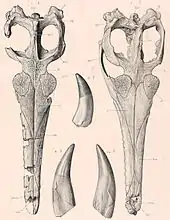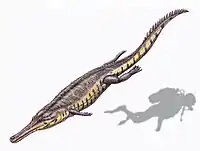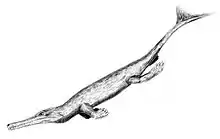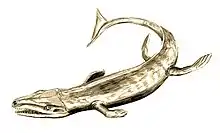Metriorhynchus
Metriorhynchus is an extinct genus of marine crocodyliform that lived in the oceans during the Late Jurassic. Metriorhynchus was named by the German palaeontologist Christian von Meyer in 1832.[1] The name Metriorhynchus means "Moderate snout", and is derived from the Greek Metrio- ("moderate") and -rhynchos ("snout").
| Metriorhynchus | |
|---|---|
| Scientific classification | |
| Kingdom: | Animalia |
| Phylum: | Chordata |
| Class: | Reptilia |
| Suborder: | †Thalattosuchia |
| Family: | †Metriorhynchidae |
| Subfamily: | †Metriorhynchinae |
| Genus: | †Metriorhynchus von Meyer, 1832[1] |
| Species | |
| |
Discovery and species
Fossil specimens referrable to Metriorhynchus are known from Kimmeridgian (Late Jurassic) deposits of France.[2]
Valid species
Only one valid species is recognized today, the type species M. geoffroyii (now called M. brevirostris).[2] "Metriorhynchus" hastifer and "M." palpebrosus are generically distinct from the Metriorhynchus type species, with hastifer being recovered as a geosaurine.[3][4] Species in this genus were traditionally classed into two skull groups: longirostrine (long, narrow jaws) and brevirostrine (short, broad jaws). However, most of brevirostrine species have been transferred to the genera Purranisaurus and Suchodus.[5][6] Metriorhynchus superciliosus has recently been shown to be distinct from the type species, M. brevirostris, and now has its own genus Thalattosuchus.[2]
The genera Purranisaurus and Suchodus have been considered junior synonyms of Metriorhynchus.[7] Recent phylogenetic analyses however, do not support the monophyly of Metriorhynchus, as conceived off in the 1860s-2010.[8][9][10][2]

Eudes-Deslongchamps (1867–69) recognized four Callovian species of Metriorhynchus: M. superciliosus, M. moreli, M. blainvillei, and M. brachyrhynchus.[11] Later, Andrews (1913) considered there to be seven valid species: M. superciliosus, M. moreli, M. brachyrhynchus, M. durobrivensis, M. cultridens, M. leedsi and M. laeve.[12] However, Adams-Tresman (1987), using linear morphometrics, could only distinguish between the two skull groups, so she found there to be two species from the Oxford Clay, M. superciliosus and M. brachyrhynchus.[13] Vignaud (1997) however, considered there to be three Callovian species: M. superciliosus, M. brachyrhynchus and M. leedsi.[14]
See also
References
- von Meyer H. 1832. Palaeologica zur Geschichte der Erde und ihrer Geschöpfe. Frankfurt am Main: Siegmund Schmerber, 560.
- Young, M.T., Brignon, A., Sachs, S., Hornung J.J., Foffa, D., Kitson, J.J.N., Johnson, M.M., and Steel, L. 2020. Cutting the Gordian knot: a historical and taxonomic revision of the Jurassic crocodylomorph Metriorhynchus. Zoological Journal of the Linnean Society, zlaa092. https://doi.org/10.1093/zoolinnean/zlaa092.
- Ősi A, Young MT, Galácz A, Rabi M. 2018. A new large-bodied thalattosuchian crocodyliform from the Lower Jurassic (Toarcian) of Hungary, with further evidence of the mosaic acquisition of marine adaptations in Metriorhynchoidea. PeerJ 6:e4668 https://doi.org/10.7717/peerj.4668
- Foffa, D., Young, M.T., and Brusatte, S.L. 2018. Filling the Corallian gap: New information on Late Jurassic marine reptile faunas from England. Acta Palaeontologica Polonica 63 (2): 287–313.
- Young, Mark T., Brusatte, Stephen L., Ruta, M., Andrade, Marco B. 2010. "The evolution of Metriorhynchoidea (Mesoeucrocodylia, Thalattosuchia): an integrated approach using geometrics morphometrics, analysis of disparity and biomechanics". Zoological Journal of the Linnean Society 158: 801-859.
- Y. Herrera, Z. Gasparini, and M. S. Fernández. 2015. Purranisaurus potens Rusconi, an enigmatic metriorhynchid from the Late Jurassic–Early Cretaceous of the Neuquén Basin. Journal of Vertebrate Paleontology 35(2):e904790
- Steel R. 1973. Crocodylia. Handbuch der Paläoherpetologie, Teil 16. Stuttgart: Gustav Fischer Verlag,116 pp.
- Young MT. 2007. The evolution and interrelationships of Metriorhynchidae (Crocodyliformes, Thalattosuchia). Journal of Vertebrate Paleontology 27 (3): 170A.
- Gasparini Z, Pol D, Spalletti LA. 2006. An unusual marine crocodyliform from the Jurassic-Cretaceous boundary of Patagonia. Science 311: 70-73.
- Wilkinson LE, Young MT, Benton MJ. 2008. A new metriorhynchid crocodilian (Mesoeucrocodylia: Thalattosuchia) from the Kimmeridgian (Upper Jurassic) of Wiltshire, UK. Palaeontology 51 (6): 1307-1333.
- Eudes-Deslongchamps E. 1867-1869. Notes Paléontologiques. Caen and Paris: 320-392.
- Andrews CW. 1913. A descriptive catalogue of the marine reptiles of the Oxford Clay, Part Two. London: British Museum (Natural History), 206 pp.
- Adams-Tresman SM. 1987. The Callovian (Middle Jurassic) marine crocodile Metriorhynchus from Central England. Palaeontology 30 (1): 179-194.
- Vignaud P. 1997. La morphologie dentaire des Thalattosuchia (Crocodylia, Mesosuchia). Palaeovertebrata 26: 35-59.
- Gasparini Z, Vignaud P, Chong G. 2000. The Jurassic Thalattosuchia (Crocodyliformes) of Chile: a paleobiogeographic approach. Bulletin Société Géologique de France 171 (6): 657-664
- Gasparini Z, Cichowolski M, Lazio DG. 2005. First record of Metriorhynchus (Reptilia: Crocodyliformes) in the Bathonian (Middle Jurassic) of the Eastern Pacific. Journal of Paleontology 79 (4): 801–805.
- Young, Mark T., and Marco Brandalise de Andrade, 2009. "What is Geosaurus? Redescription of Geosaurus giganteus (Thalattosuchia: Metriorhynchidae) from the Upper Jurassic of Bayern, Germany." Zoological Journal of the Linnean Society, 157: 551-585.



